ISVS-13 Seminar Successfully Concluded
ISVS-13 Seminar was successfully concluded on the 30th November 2024, with the visit to Lunuganga, the Dutch Galle Fort and a hotel designed by the renowled architect Vijitha Basnayake. Altogether 46 papers were presented through two main sessions in the morning and three parallel sessions in the afternoons on 28th and 29th. Prof Ganesh Devi from India, Prof. Joe Aranha from the United States and Dr. Milinda Pathiraja from Sri Lanka delivered the key-note speeches which were inspirational and exquisite. The presentations were breathtaking sometimes in terms of how vernacular exists in the world and inspires the young architects to create culturally relevant poetics of space. ISVS-13 was hosted by the Asian School of Knowledge of Sri Lanka. The facilities and the support services were made available by the university of Moratuwa.
The Final Group Photo of the Participants
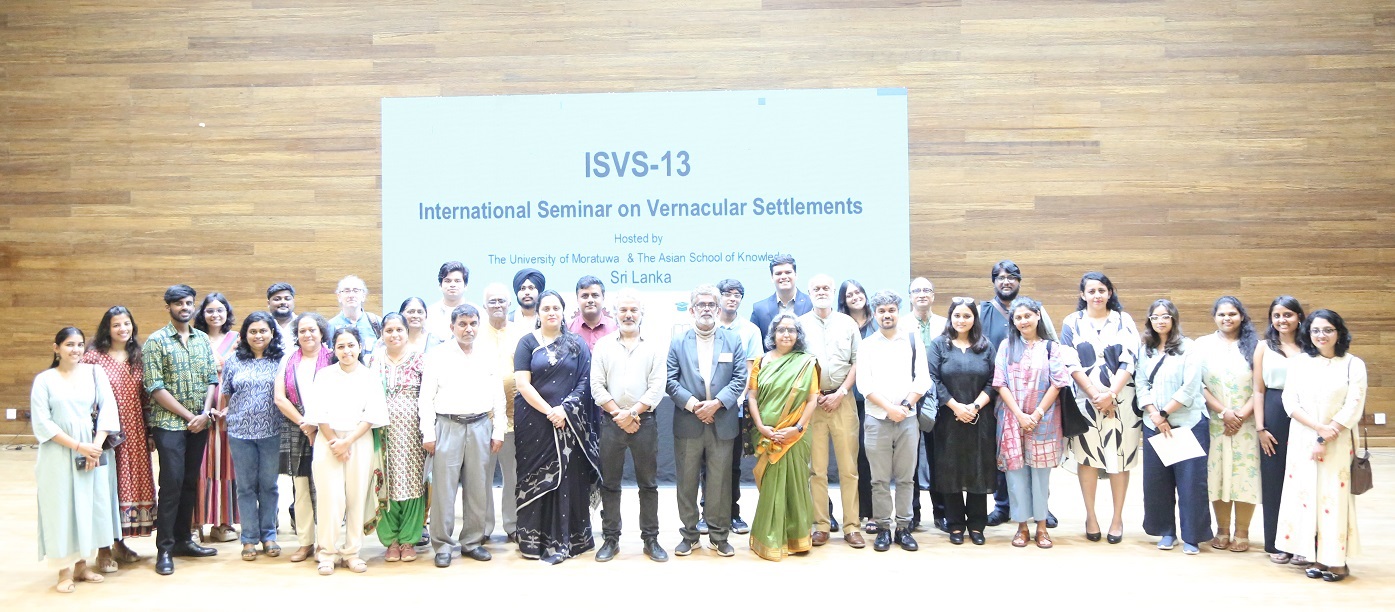 Please see below the final schedule of presentations
Please see below the final schedule of presentations
ISVS-13 Final Schedule of Presentations
Please see below some instructions for the preparation of the presentations. Please use PowerPoint as the presentation system and produce a graphically well-composed, and textually-meaningful presentation. Do not overcrowd the slides with excessive text. Please hand over your presentation to Priyanka Kanhari at the venue on the 27th evening, if you attend in-person. If you present online, send it to her by 26th evening; her email is 'priyankak@nuv.ac.in'Instructions for Presentations
Zoom Link for Day 01-28th
Zoom Link for Day 02-29th
Trip to Lunuganga and Galle
Arrival Instructions
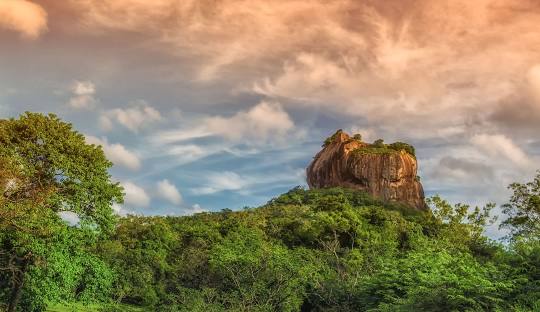
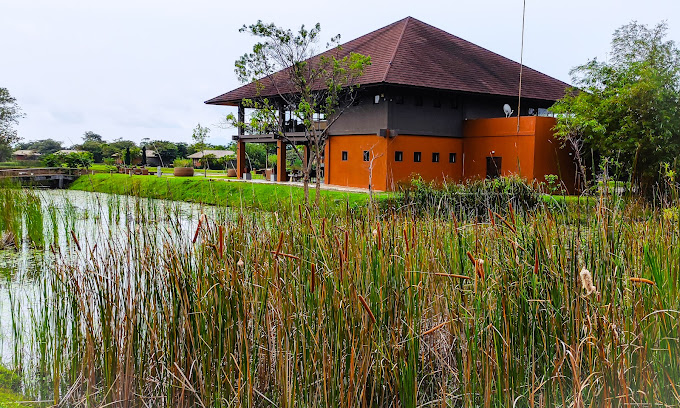
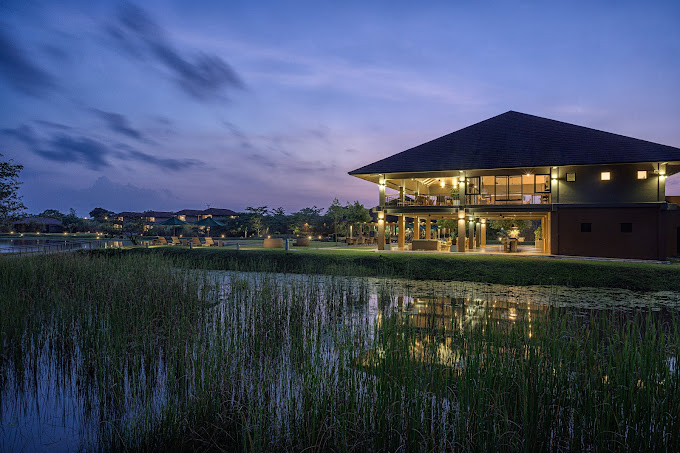
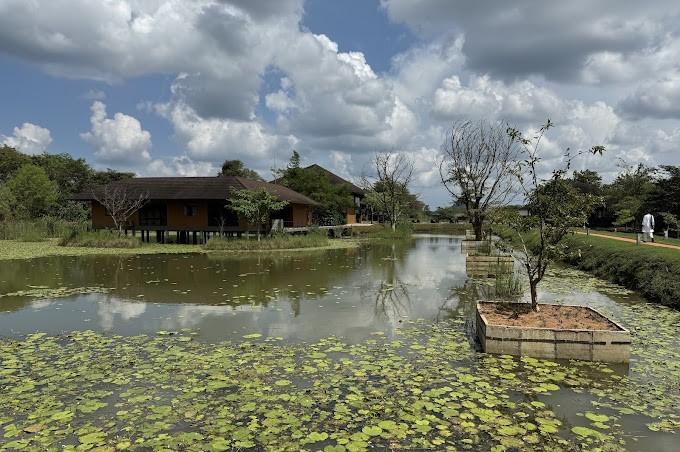
ISVS-13 Seminar will be held within the premises of the University of Moratuwa of Sri Lanka. Here is how you go there.
Those who are presenting in-person and those who are attending have been sent letters to support their VISA. Indian nationals are entitled for 'on-arrival visa'. Please check the Department of Immigration and Emigration, Sri Lanka for further information.
On arrival at the Colombo Airport, collect your baggage and exit; you have three options to go to your accomodation:either Subodhi, or Berjaya. On the right side of the arrival hall, there are a number of Taxi Stands. You can take a taxi from here. Alternatively, go towards the left and exit from S-2. Here you have two options. One is to book a UBER Ride. The other is to book a 'PICK ME Taxi'. Both these options are cheaper than the Main Taxi options. Give your destinations: Berjaya in Mount Lavinia or Subodhi in Katubedda. Neither UoM nor ISVS can pick you up from the Airport.
Once you check in at the Hotel, you can take a taxi from the Hotel and come to the University of Moratuwa Premises at Katubedda. If you stay at Subodhi, you can walk to the University.
Understanding and Documenting Cultural Heritage for a Culturally-Anchored Future:
Historical Vernacular and the Contemporary Settlements
ISVS-13 will be held from 27th -30th November in Colombo, Sri Lanka, on the theme 'Understanding and Documenting Cultural Heritage for a Culturally-Anchored Future: Historical Vernacular and the Contemporary Settlements.' Sri Lanka is full of Vernacular Settlements, Historical Sites, Wild life, Beaches and Nature. There is no better place to continue the journey of ISVS than Sri Lanka, after the cyclones in Thailand, with its breath-taking Nature and unmatched-hospitality. Sri Lanka is one of the world's best places to visit. We invite you to come to Sri Lanka, present your paper and enjoy the great places, food, Nature and culture. Make new connections for more interractive academic pursuits. If you join online and stay home, you remain on your own and will feel isolated.
We look forward to seeing you in Sri Lanka in November 2024.
Keynote Speaker 1: 27th November 2024 evening
Our first keynote speaker is Prof. Ganesh Devy from India.
Prof. Ganesh Devy is a cultural activist, literary critic and a former professor of English. He is known for the People's Linguistic Survey of India and the Adivasi Academy created by him. He is credited with starting the Bhaashaa research and Publication Centre and writes in three languages: Marathi, Gujarati and English. His first full-length book in English is After Amnesia (1992). Since then, he has written and edited close to ninety books in areas including Literary Criticism, Anthropology, Education, Linguistics and Philosophy.
Indeed, Prof Ganesh Devi is an erudite Scholar and has been in the forefront of the promotion of vernacular culture in India in particular and the world in general. The 'Adivasi Institute' he has created to understand and reserach about the vernacular communities in India, who are numerous and speak a multitude of languages is exemplary and unique. He will surely enlighten the participants of the inaugural session and inspire them by sharing the wealth of his knowledge and experiences in understanding the vernacular communities.
Keynote Speaker 2: 28th November 2024 Morning
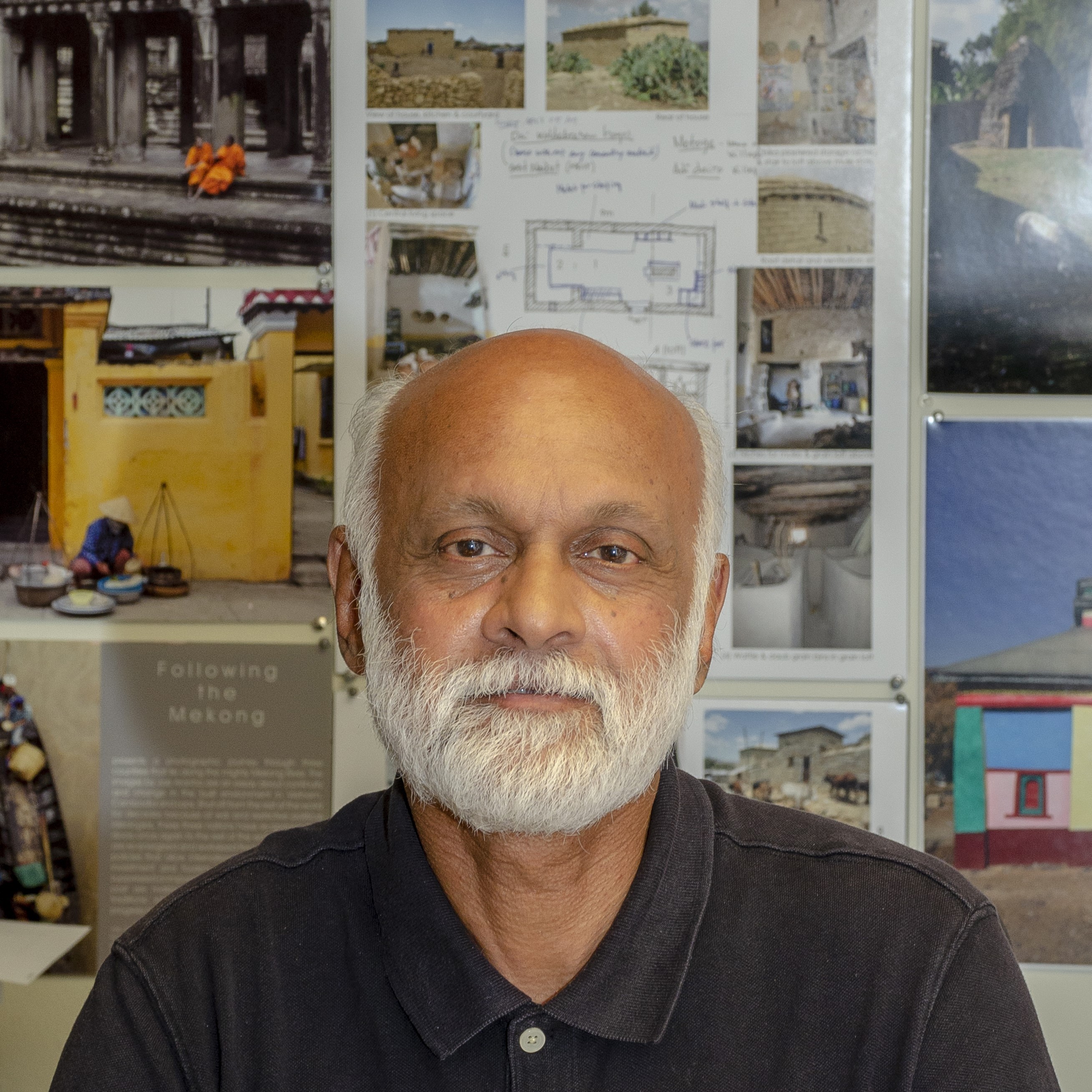
Our Second keynote speaker is Prof. Joseph Aranha from USA.
Joseph Aranha is a full professor in the Huckabee College of Architecture, Texas Tech University, USA, where he teaches architectural design studio and courses on traditional and contemporary architecture in nonwestern societies. He has held invited teaching appointments in Malaysia, Spain, Mexico, Ethiopia, Zimbabwe and India. His research interests in vernacular and traditional architecture have taken him to many parts of the world for research and study of traditional and vernacular built environments. His publications focus on meaning and symbolism and continuity and change in traditional architecture. He has been a recipient of two US Fulbright Scholar awards to Zimbabwe and Ethiopia respectively and has been hosted as a Fulbright Specialist at universities in India, Mexico, and Indonesia (Bali). He has been invited to co-direct international architectural design workshops in Vietnam and Tongji University, Shanghai, China and has led architecture study abroad programs for his home institution in Spain and Mexico.
He is a contributor to the Encyclopedia of Vernacular Architecture of the World, edited by Paul Oliver. His photographs of traditional architecture have been exhibited in Spain, Portugal, Thailand and Lebanon. At his home institution Professor Aranha has been a recipient of the Presidents Excellence in Teaching Award, recognized for his dedication to study abroad by a Lifetime Global Achievement Award and honored as an Integrated Scholar for having consistently combined his research interests with teaching in a variety of ways. Recent significant funded projects in which he has played important roles include a USD1.6 M internationally funded multidisciplinary project to develop home grown higher education programs in a consortium of universities in Ethiopia and a soon to begin project to document traditional wood architecture in Timor, Indonesia.
He will bring to the seminar new perspectives about living and thriving in tribal settlements in the African subcontinent, and how cultural heritage of those places are being destroyed while the academia is trying hard to record them and preserve them.
Keynote Speaker 3: 29th November 2024 Morning
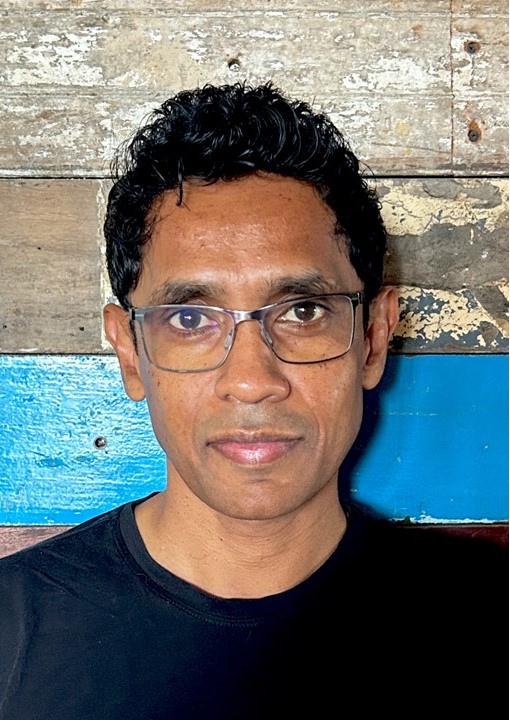
Our Third Keynote Speaker is Architect Dr. Milinda Pathiraja from Sri Lanka.
Milinda is a Senior Lecturer at the Department of Architecture, the University of Moratuwa, Katubedda, Sri Lanka, a Visiting Professor, at the School of Architecture, Civil and Environmental Engineering (ENAC), the Swiss Federal Institute of Technology (EPFL), Lausanne, Switzerland and an Honorary Senior Fellow at the Faculty of Architecture, Building and Planning, University of Melbourne, Australia. As an architect of the new generation, he has produced architecture that could be construed as vivid articulations of documenting vernacular heritage through buildings drawing especiallyupon the vernacular principles and approaches related to labour and craftmanship. He is an erudite scholar and an exemplary architectural practitioner who employs a place-based process to produce unique contemporary architecture derived from the principles of vernacular.
Milinda has delivered key note speeches at Australian Architecture National Conference 2024, the Department of Architecture and Landscape at the Kingston School of Art, Kingston University, UK, The Kurula Varkey Design (KVD) Forum, CEPT University, Ahmedabad, India, at Dialogues 09, Henley Halebrown Architects, London, UK, as well as TedX Colombo, Sri Lanka, among numerous others around the world. It will be fascinating to hear from him how he views craftsmanship as a central pillar of traditions that can inform and produce great architecture for today.
The Theme
Vernacular and Cultural Heritage go hand in hand. On the one hand, vernacular is undeniably a significant cultural heritage. On the other hand, cultural heritage exists everywhere including in the vernacular settlements. Whatever the case may be, cultural heritage has a significant role to play both in the present and the future of the human settlements. That is because Man is a social and cultural being and his existence requires him to be both socially and culturally anchored in a geographical space. Erase his cultural anchor, and he is going to be an uprooted wonderer, as the case of the Australian aborigines have clearly demonstrated, when uprooted from his abode by the Migrant settlers. To identify, conserve and articulate such cultural heritage, it must be first understood. The deeper meanings they carry have to be revealed and symbolic meanings have to be enriched. Indeed, both the present settlements as well as the future settlements would be poorer without such cultural heritage being layered underneath the communities inhabiting those settlement landscapes. Among many things that need to be done to identify, conserve and articulate cultural heritage, they must first be understood and documented. The ISVS-13 seminar invites the scholars dealing with vernacular settlements and cultural heritage to explore the numerous ways and means of documenting cultural heritage. These may include oral, verbal as well as manual documentations, not to mention other means such as buildings and structures, manuscripts and traditional ways of keeping the memories of such heritage alive along with the most modern digital technologies. Accordingly, following themes are suggested, but the papers are not limited to these themes. Other innovative papers can also be suggested.
Theme 1: Oral documentation of cultural heritage
Theme 2: Verbal and written documentation of cultural heritage
Theme 3: Manual documentations of cultural heritage
Theme 4: Buildings as documentations of cultural heritage
Theme 5: Digital ways of documentation of cultural heritage
Theme 6: Documentation, Power and Institutions
Theme 7: Vernacular Traditions, Culture, Rituals, Performances & Architecture
Theme 1: Oral documentation of cultural heritage
Under this theme, papers that deal with oral documentations such as songs, poems, stories and other narratives can be presented.
Theme 2: Verbal and written documentation of cultural heritage
Under this theme, papers that deal with written documentations such as manuscripts, books, newspapers, letters, public announcements, deeds, or any other form of written documentations of cultural heritage can be presented.
Theme 3: Manual documentations of cultural heritage
Under this theme, manual documentations involving drawings, cartoons, paintings and other media documentations can be presented.
Theme 4: Buildings as documentations of cultural heritage
While buildings themselves are a form of cultural heritage, buildings can also be seen as having recorded the histories of events and places. Under this theme, such interpretations can be presented.
Theme 5: Digital ways of documentation of cultural heritage
Under this theme, modern digital ways of documentations of cultural heritage can be presented.
Theme 6: Documentation, Power and Institutions
Under this theme, the role of institutions in negotiating the complex social and political aspects as related to documentation within the act of documenting any cultural heritage can be presented. It is understood that documenting is not a value neutral one and is loaded with questions of power, transmission of knowledge and control over people and practices. They can be reflected upon here.
An Invitation to Participate
Those who are interested in participating in the ISVS-13 under one or more of these themes are requested to submit first a 300 word long abstract, introducing the issue, the way the data was collected and what conclusions were drawn from the research. The abstracts are reviewed by the ISVS Review Panel and if approved, the authors will be asked to produce the final papers and submit them for presentation at the seminar.
Publication
All the papers presented at the seminar will be published in the ISVS e-journal, after subsequent development, review and revisions.
Please send the paper proposal abstracts to conference@isvshome.com or ranjithdayaratne@gmail.com using the template as noted below.
ISVS13 Abstract Template
Submission Deadlines
Seminar announcement: 30th May 2024
Submission of Abstracts: 20th July 2024
Approval of Abstracts: 30th July 2024
Submission of Full Papers: 15th September 2024
Review of Full papers: 30th September 2024
Final Submission of papers: 15th October 2024
Please send the final paper only to conference@isvshome.com prepared using the template as noted below.
ISVS-13 Template for Final Papers
Date of Seminar: 27th to 30th November 2024
Conference Fee (Revised)
Local: 50 USD for one attendee - 15000.00 Rs.
Local: 100 USD for one presenter - 30000.00 Rs.
Foreign: 150 USD for the first presenter and 100 USD for each additional authors attending (in-Person)
Foreign: 100 USD for each author presenter (online)
Foreign: 100 USD for one attendee without a paper
Please note that Conference fees once paid cannot be refunded, if you fail to attend either online or in-person. Conference planning is done on the basis of your registration and that cannot be undone, by ad-hoc cancellations or non-attendance.
Certificates of Attendance (in-Person) cannot be issued to those who do not attend in-person. This means if only one person attended, and presented a paper with several authors, that person will receive the certificate of attendance and not all the authors listed in the paper. Similarly, those who present online will receive a 'certificate of presentation (online)'. Again, only those registered will have access to the seminar and thepresentation seession and will receive the certificate. If there are more authors to the paper and they do not register, they cannot be admitted to the seminar and will not receive any certificate to say that they presented the paper at the seminar. In otherwords, the certificates will correspond to the actual participation: either online or in-person.
Final Seminar Schedule
ISVS-13 Tentative Schedule
Submission Deadlines
Seminar announcement: 30th May 2024
Submission of Abstracts: 20th July 2024
Approval of Abstracts: 30th July 2024
Submission of Full Papers: 15th September 2024
Review of Full papers: 30th September 2024
Final Submission of papers: 15th October 2024
Please send the final paper only to conference@isvshome.com prepared using the template as noted below.
ISVS-13 Template for Final Papers
Date of Seminar: 27th to 30th November 2024
Conference Fee (Revised)
Local: 50 USD for one attendee - 15000.00 Rs.
Local: 100 USD for one presenter - 30000.00 Rs.
Foreign: 150 USD for the first presenter and 100 USD for each additional authors attending (in-Person)
Foreign: 100 USD for each author presenter (online)
Foreign: 100 USD for one attendee without a paper
Please note that Conference fees once paid cannot be refunded, if you fail to attend either online or in-person. Conference planning is done on the basis of your registration and that cannot be undone, by ad-hoc cancellations or non-attendance.
Certificates of Attendance (in-Person) cannot be issued to those who do not attend in-person. This means if only one person attended, and presented a paper with several authors, that person will receive the certificate of attendance and not all the authors listed in the paper. Similarly, those who present online will receive a 'certificate of presentation (online)'. Again, only those registered will have access to the seminar and thepresentation seession and will receive the certificate. If there are more authors to the paper and they do not register, they cannot be admitted to the seminar and will not receive any certificate to say that they presented the paper at the seminar. In otherwords, the certificates will correspond to the actual participation: either online or in-person.
Final Seminar Schedule
ISVS-13 Tentative Schedule
Date of Seminar: 27th to 30th November 2024
Conference Fee (Revised)
Local: 50 USD for one attendee - 15000.00 Rs.
Local: 100 USD for one presenter - 30000.00 Rs.
Foreign: 150 USD for the first presenter and 100 USD for each additional authors attending (in-Person)
Foreign: 100 USD for each author presenter (online)
Foreign: 100 USD for one attendee without a paper
Please note that Conference fees once paid cannot be refunded, if you fail to attend either online or in-person. Conference planning is done on the basis of your registration and that cannot be undone, by ad-hoc cancellations or non-attendance. Certificates of Attendance (in-Person) cannot be issued to those who do not attend in-person. This means if only one person attended, and presented a paper with several authors, that person will receive the certificate of attendance and not all the authors listed in the paper. Similarly, those who present online will receive a 'certificate of presentation (online)'. Again, only those registered will have access to the seminar and thepresentation seession and will receive the certificate. If there are more authors to the paper and they do not register, they cannot be admitted to the seminar and will not receive any certificate to say that they presented the paper at the seminar. In otherwords, the certificates will correspond to the actual participation: either online or in-person.Final Seminar Schedule
ISVS-13 Tentative Schedule
Accomodation Options
Option 01. Luxury Accomodation in a Resort Hotel: Ranmal Hotel, Moratuwa
About 4 km away from the venue, further away towards Moratuwa from Colombo, Ranmal offers classy accomodation in luxury resort setting, overlooking a lake. A total of 20 rooms are availabe here either single occupancy, dual occupancy or triple occupancy. Discounted and specially negotiated rates are as follows.
Single: 55 USD B/B per night;
Double: 60 USD B/B per night;
Triple: 65 USD B/B per night;
Booking to avail these rates have to be made through ISVS. Therefore, if you need any reservations, do let us know early. Otherwise, you can book direct.
The University of Moratuwa will provide a pick-up and drop-off in the morning and in the evening on the 28th and 29th.
Please visit the website below for details. http://www.ranmalholidayresort.com/accommodation.php
Option 02. Berjaya Hotel, Mount Lavinia
About 8-10 km away from the venue towards Colombo, Berjaya hotel located overlooking the sea in Mt. Lavinia offers well-appointed accomodation in an urban resort hotel setting. A total of 80 rooms are availabe here either single occupancy, dual occupancy or triple occupancy.
Discounted and specially negotiated rates are as follows.
Single: 50 USD B/B per night;
Double: 55 USD B/B per night;
Triple: 65 USD B/B per night;
Booking to avail these rates have to be made through ISVS. Therefore, if you need any reservations t these rates, do let us know early. If not you can book direct.
The University of Moratuwa will provide a pick-up and drop-off in the morning and in the evening on 28th and 29th.
Please visit the website for details. https://www.berjayahotel.com/colombo/rooms.html
With 80 rooms, ISVS recommends this the most, so that all the participants can preferably stay in one placeOption 03: Subodhi Intergral Education Centre: AC Rooms
About half a KM away from the University of Moratuwa, this place offers modest accomodation in air-conditioned rooms with two separate beds and an attached toilet. 10 Rooms are availabe in this style.Room Rates are approximately 6000.00 Sri Lankan Rupees per night twin-sharing, without breakfast. Breakfast will be provided on request.This is a place where often, local seminars are held for students arriving from other parts from Sri Lanka for educational programs run by the Christian Missionary. The buildings have been designed by the world renowned Sri Lankan architect Geoffery Bawa, employing the language of traditional Sri Lankan Architecture. This location provides a good atmosphere to engage in conversations about the role of vernacular traditions in the modern world. The participants will be able to enjoy both Sri Lankan hospitality as well as the exotic Sri Lankan natural landscape.
Please visit the website below for detais. https://www.subodhi.org/gallery/
Option 04. Sarvodaya Hostels
About 4 km away from the venue, sarvodaya offers modest accomodation in a hostel-like setting with four beds per room with attached toilets. A total of 20 rooms are availabe here. The University of Moratuwa will provide a pick-up and drop-off in the morning and in the evening on the 28th and 29th if needed.
Please visit the website below for detais and go to the bottom: accomodation. https://www.sarvodayaleisure.lk/moratuwa/
Contact
For any inquiries, please contact Ranjith Dayaratne at conference@isvshome.com